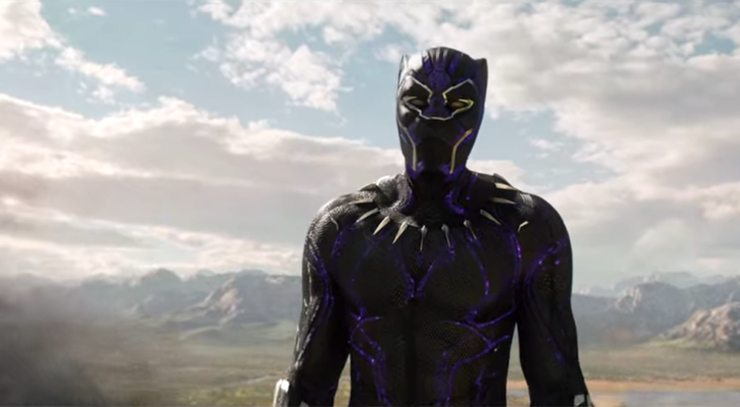One of the things that the Marvel Cinematic Universe has been introducing into their little oeuvre is the many-worlds theory, with divergent timelines. After hints of it in Doctor Strange, we got a major use of it in Avengers: Endgame, it played a role in Spider-Man: Far from Home, and the next Strange film has “multiverse” in the subtitle, so it may come up again—not to mention What If…? being one of Marvel’s upcoming offerings on Disney+.
I mention this only because somewhere there’s a divergent timeline where Wesley Snipes starred as the Black Panther in the 1990s.
The future Blade actor was connected to a Panther film starting in 1992 and continuing all the way into the mid-2000s. It was a passion project for longtime comics fan Snipes, who—after decades of stereotypical portrayals of the so-called “dark continent”—wanted a film that would show the majesty and grandeur of Africa.
However, the film languished in development hell throughout the final decade of the old millennium and the first decade of the new one. Supposedly one of the issues was that people were confused by the name, thinking it was about the political organization, the Black Panther Party. Mario van Peebles and John Singleton were both connected to direct at various times.
By the time Marvel Studios got on track following the success of the Marvel Cinematic Universe, Snipes was convicted of failing to file tax returns and imprisoned, which made it difficult for him to be involved.
The backstory of the various Black Panther comics started showing up in the MCU as early as Captain America: The First Avenger. The Panther’s home of Wakanda has always been the home of vibranium—that has been the source of Wakanda’s economy and technological prowess going back to the character’s first appearance in Fantastic Four #52-53 by Stan Lee & Jack Kirby in 1966. The First Avenger introduced vibranium to the MCU, as Captain America’s shield was made from it. Wakanda itself was introduced as a seemingly minor African nation in Avengers: Age of Ultron, where we also met Ulysses Klaue, who was selling vibranium he’d stolen from Wakanda to Ultron (who cut off Klaue’s left hand for his trouble).
Kevin Feige announced Black Panther as part of Phase 3 of the MCU in 2014. With Snipes out of the picture, Chadwick Boseman was announced as playing the lead, to be introduced in Captain America: Civil War. After an exhaustive process—one that included Ava DuVernay being seriously considered before the director herself pulled out—Ryan Coogler was hired to direct, fresh off his success with Creed. Coogler is a longtime fan of comics in general and the Panther in particular.
The script, by Coogler and Marvel Studios’s John Robert Cole, included elements from all throughout the Panther’s comics history: the heart-shaped herb that gives the Panther his strength and agility, which goes back to the 1960s; the Dora Milaje, the female protectors of Wakanda, as well as Nakia and Everett K. Ross, all introduced during Christopher Priest’s run on Black Panther at the turn of the millennium, a run that also focused significantly on the Panther’s role as a world leader, not just a superhero; Shuri, T’Challa’s sister, from Reginald Hudlin’s run in the early 2000s; and in general, the three main bad guys in the Panther’s oeuvre are all here: Klaue (Klaw in the comics, complete with prosthetic hand that’s a sonic weapon, created in the 1960s by Lee & Kirby), Killmonger (created in the 1970s by Don McGregor during his historic run writing the character for Jungle Action), and “Man-Ape” (with that name thankfully removed, and simply referred to by his given name of M’Baku, created by Roy Thomas in Avengers when the Panther was an active member of the team).
Back from Civil War are Boseman as T’Challa, John Kani as T’Chaka (with Atwanda Kani, the actor’s son, playing T’Chaka as a younger man in 1992), Martin Freeman as Ross, and Sebastian Stan as Bucky Barnes in the post-credits scene. Back from Age of Ultron is Andy Serkis as Klaue. Introduced in this film are Lupita Nyong’o as Nakia, T’Challa’s on-again, off-again love interest and a covert operative for Wakanda; Danai Gurira as Okoye, the leader of the Dora Milaje; Letitia Wright as Shuri, T’Challa’s sister and the biggest genius in the MCU (yes, I said it); Daniel Kaluuya as W’Kabi, who guards Wakanda from outside attack; Winston Duke as M’Baku, head of the Jabari tribe, one of the five tribes that make up Wakanda, and the one that remains outside the day-to-day of the nation; Angela Bassett as Queen Ramonda, T’Chaka’s widow and the mother of T’Challa and Shuri; Forest Whitaker as Zuri, with Denzel Whitaker (no relation) as the younger Zuri in 1992; Michael B. Jordan as N’Jadaka, a.k.a. Killmonger, T’Challa’s cousin; and Sterling K. Brown as N’Jobu, Killmonger’s father and T’Chaka’s brother.
Boseman, Stan, Gurira, Wright, and Duke will next appear in Avengers: Infinity War. Bassett will next appear in Avengers: Endgame. Nyong’o and Freeman are scheduled to next appear in the sequel to this film, which is currently scheduled for May 2022, and one hopes that Kaluuya will be in that one as well.
“I never freeze”
Black Panther
Written by Ryan Coogler & Joe Robert Cole
Directed by Ryan Coogler
Produced by Kevin Feige
Original release date: February 16, 2018
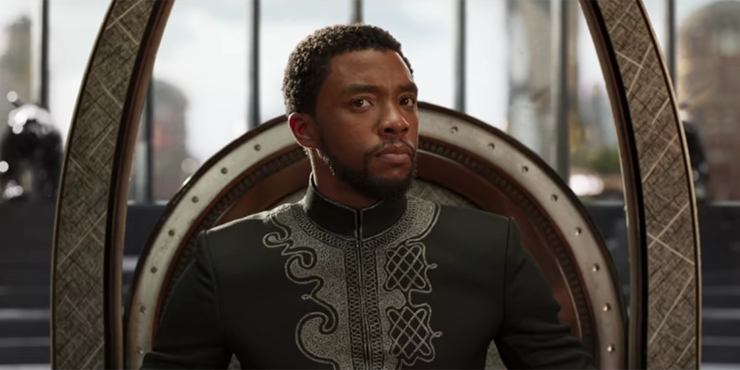
A little boy asks his father about Wakanda (this is presumably T’Challa as a child asking his father T’Chaka). Thousands of years ago, a meteorite containing vibranium crashed in Africa, and five tribes fought over it. One warrior, who ingested a heart-shaped herb infused with vibranium, saw a vision of the goddess Bast and became the Black Panther, who united the five tribes. Four of the tribes still rule Wakanda, with only the Mountain Tribe withdrawing. Wakanda has stayed hidden from the outside world, keeping their advanced technology away from the wars of the rest of the Earth, protecting their nation.
In 1992 Oakland, we meet a man who goes by Stevens, but who is really a “war dog,” an undercover Wakandan operative, named N’Jobu, who is also the brother to King T’Chaka. However, his aide turns out to also be Zuri, a Wakandan spy, to N’Jobu’s shock. N’Jobu has gone native, and wants to help their fellow Africans in the U.S. To that end, he gave the location of one of their vibranium stores to Ulysses Klaue, who stole it, killing many Wakandans, in exchange for weapons. T’Chaka wants to bring N’Jobu back home to answer for his crimes, but he takes up arms against his brother, who is then forced to kill him. His body is left behind, as are the wife he took in California and their son Eric, all to protect Wakanda’s anonymity.
In the present day (actually a week after Civil War, so really still in 2016, but whatever), T’Challa is ready to take the throne after his father T’Chaka’s death in Vienna. First, though, he and the leader of the Dora Milaje, General Okoye, go to extract Nakia, T’Challa’s sometime lover, who is on a deep-cover mission to save people from Boko Haram slavers. Nakia had not heard about T’Chaka’s death, and T’Challa wants her by his side when he is crowned.
They return to Wakanda, flying past W’Kabi and the farms and agrarian society that most of the world thinks is all there is to Wakanda, then through the rainforest that is actually a hologram hiding a futuristic city that is nonetheless patterned after the archeology of ancient Africa.
T’Challa, Nakia, and Okoye are greeted by Queen Ramonda and T’Challa’s sister Shuri, who has created some new pieces of technology for him.
The coronation ritual is held on a mountainside, led by Zuri, now a Wakandan elder. Each of the four tribes is given the chance to challenge T’Challa for the throne, as are members of his family. (Shuri raises her hand, but it’s mostly to ask that they move along with this, as the corset she’s wearing is uncomfortable.)
But then, to everyone’s shock and dismay, the Jabari Tribe from the mountains arrive. M’Baku challenges T’Challa, on the grounds that he couldn’t protect his father, and that his sister doesn’t follow the old ways, and just generally that he sucks.
They fight, with a group of Dora Milaje and a group of Jabari each forming a half circle to keep the fight contained. The circle gets ever-smaller, and eventually, T’Challa—who has been given a drug that removes the effects of the heart-shaped herb that gives him his extranormal abilities—is victorious. He urges M’Baku to yield—”Your people need you,” are the words that convince him.
T’Challa then once again takes the heart-shaped herb, after which he is buried and visits the Ancestral Plains. He visits the spirit of his father, and then returns to Wakanda.
In London, N’Jobu’s son, Eric “Killmonger” Stevens visits a museum’s African art exhibit. He makes some acid comments to one of the museum staff about how the artifacts were stolen right before she collapses in pain from the poison in her coffee, put there by Killmonger’s girlfriend, who got a job in the museum as a barista. They’re working with Klaue, and they steal a vibranium artifact, as well as a mask.
Okoye gets word of the theft of the vibranium by Klaue, and also learns that he’s going to sell it in Busan, South Korea. T’Challa, Okoye, and Nakia travel to Busan capture Klaue and bring him to justice for his thirty-year-old theft. (W’Kabi wishes to go also, as Klaue killed his father, but T’Challa says he needs W’Kabi to protect Wakanda itself.)
They arrive at the casino where the transaction is to take place. There are several Americans, including CIA Agent Everett K. Ross, whom T’Challa met in Europe after his father’s death. Ross tells T’Challa in no uncertain terms to buzz off, reminding him that Ross kept the secret of the Black Panther outfit (which was not what you’d expect the prince of an agrarian society to own). T’Challa retorts that he is taking Klaue back to Wakanda, period.
Klaue himself arrives with a massive entourage, one of whom makes Okoye (despite the fact that the normally bald general is wearing a wig; she later uses that wig as a weapon). A fight breaks out, and Klaue escapes with the vibranium, and without the diamonds Ross was going to pay him with.
Klaue and his people escape and drive into Busan, but the Wakandans give chase, Nakia and Okoye in one car, Shuri remotely driving the other car from Wakanda. Klaue manages to blow up both cars with his shiny new prosthetic hand, which includes a sonic cannon, but T’Challa captures him nonetheless.
Ross interrogates Klaue, who insists that there’s more to Wakanda than meets the eye. Ross is skeptical. Okoye just wants to take Klaue back with no regard for the CIA, but T’Challa is more diplomatic than that.
Then Killmonger shows up and breaks Klaue out. Ross takes a bullet to the spine for Nakia, and T’Challa orders him brought to Wakanda. (Okoye objects, but neither Nakia nor T’Challa will just let him die, especially after an act of heroism.)
When they arrive at Wakanda, W’Kabi is furious that they failed to capture Klaue. He had hoped that T’Challa would be more effective than T’Chaka was in capturing the murderer of his father, but apparently not.
T’Challa is more concerned with the fact that one of the people who broke Klaue out was wearing the ring belonging to N’Jobu. Zuri sadly tells the whole story, including that T’Chaka left his brother’s body as well as N’Jobu’s wife and son behind. Killmonger must be N’Jobu’s son grown up.
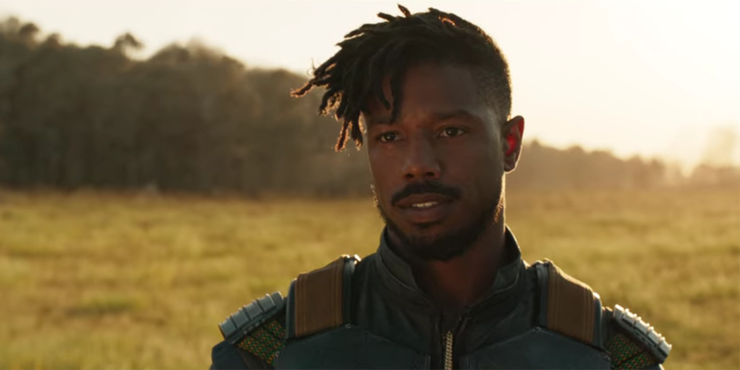
Killmonger turns on Klaue, killing one of his cohorts in cold blood. Klaue takes Killmonger’s girlfriend hostage, so he shoots her in the head so he can get to Klaue. He then takes Klaue’s body to Wakanda as an offering by way of getting an audience with the council.
Ross—who is rather stunned by the true face of Wakanda—recognizes Killmonger as a CIA wet work operative, and a damned talented one, too. Killmonger himself claims the throne as the son of N’Jobu. He also is less than impressed with Wakanda itself, disgusted that they’ve sat safe in the fake rainforest while their people the world over have been oppressed.
The four tribes reluctantly agree to his challenge. The fight at the mountain is brutal. At one point, Zuri tries to stop Killmonger from killing T’Challa, saying that it was Zuri’s fault that N’Jobu died. Killmonger kills Zuri, then throws T’Challa over the waterfall.
Claiming the throne as his, Killmonger takes the heart-shaped herb and then visits the Ancestral Plains. Where for T’Challa it was an African plain, for Killmonger it’s the apartment he grew up in in Oakland. We see that Killmonger learned of Wakanda from his father’s notebooks, which he hid behind a false panel in the wall. N’Jobu’s spirit speaks to him, telling him that Wakanda has the most beautiful sunsets, and he hopes to take his son there some day.
Waking up screaming, Killmonger orders the heart-shaped herbs all burned. When the priests point out that they need them for the next king, Killmonger threatens them, obviously not liking the idea of a next king.
Nakia manages to sneak one herb off before the conflagration. She, Ramonda, Shuri, and Ross are in hiding. Nakia tries to convince Okoye to join them to overthrow Killmonger, but Okoye refuses—she is sworn to protect the throne, and Killmonger won the challenge. The throne is his, and that is who she is loyal to.
The four refugees go to the mountains to M’Baku’s throne, pleading with him. Nakia offers him the heart-shaped herb, but M’Baku has something better: T’Challa. One of his fishermen found him in a coma. They put him in snow to keep him cool, but the minute they take him out of that (say, to go to Shuri’s lab to save him), he’ll die.
So they feed him the heart-shaped herb and bury him.
This time, on the Ancestral Plains, T’Challa has no kind words for his father. He is disgusted by Killmonger’s words—both the fact that he was abandoned as a child, and by the fact that he’s right about Wakanda’s isolationism.
T’Challa wakes up and asks for a blanket. He asks M’Baku for help, which M’Baku refuses at first—as far as he’s concerned, he saved T’Challa, which repays the debt M’Baku owed him for sparing his life during the challenge. But T’Challa points out that Killmonger isn’t likely to leave the Jabari alone…
Killmonger is sending vibranium weapons to the war dogs around the world to start the revolution that will make Wakanda the largest empire in the world. While he initially has the support of both the Dora Milaje (out of loyalty to the rightful ruler of Wakanda) and W’Kabi and his people (because he brought Klaue to justice), when T’Challa reappears, the Dora Milaje reverse course. T’Challa is still alive and has not yielded, so the challenge is not yet over, and Killmonger is not yet king.
The Dora Milaje, aided by Shuri and Nakia—and eventually by the Jabari—fight against W’Kabi’s people as well as their cavalry, to wit, armored rhinos. Meanwhile, T’Challa and Killmonger fight directly, while Ross (a former Air Force pilot) remote pilots a Wakandan ship and uses it to take down the ships that are bringing vibranium weapons to the war dogs in the outside world.
Eventually, W’Kabi yields to Okoye (who is also his lover; plus his attack rhino knows and likes Okoye, and licks her face rather than attack her). T’Challa defeats Killmonger by stabbing him. T’Challa offers to save him, but he refuses—he’d rather die than be imprisoned, and wishes to be buried in the Atlantic Ocean with all the people who escaped being sold into slavery by jumping overboard and drowning. T’Challa does allow him to see a Wakandan sunset, which is as beautiful as N’Jobu had promised.
T’Challa retakes the throne, and swears that Wakanda will no longer be isolationist. To that end, he buys the Oakland building that Killmonger grew up in, as well as the buildings on either side of it. They will become the first Wakandan Outreach Centers. Nakia agrees to help run them, with Shuri helping as well. T’Challa speaks before the UN in Vienna—the same site where his father died—and declares his intentions to the world.
Shuri has also taken the Winter Soldier out of stasis, telling him there is much to learn.
“Wakanda forever!”
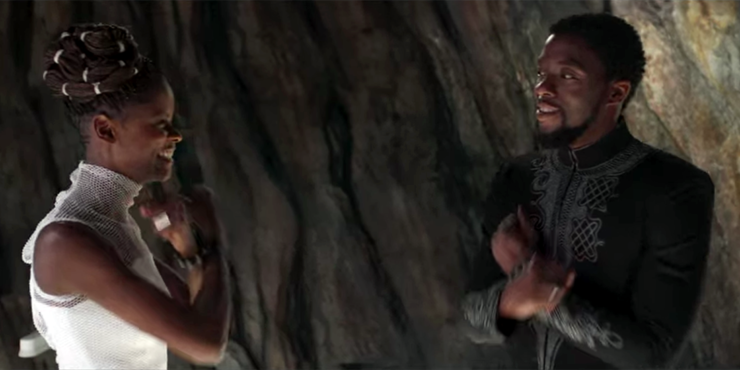
I teach a couple of afterschool karate programs at schools and facilities here in New York, and at one location, when the weather’s nice, I’ll sometimes do the class outside in the playground behind the school. One time, in the spring of 2018, I did a class outside and had the kids running a race. One boy, after winning his race, raised his arms and shouted, “WAKANDA FOREVER!”
I mention that mainly to point out how incredibly influential and pervasive this movie was, not just in the nerd community, but also in the African-American community. Afrofuturism has become an increasingly powerful subgenre in science fiction, and this is one the first mainstream movies to really play around in that genre, and it’s glorious.
The feel of the movie is delightful as it’s true to multiple African cultures, and indeed represents the entirety of the continent—not just the nations and communities represented in some way or other by the five tribes, but also the Boko Haram at the top of the movie and Klaue’s Afrikaans accent. But in addition to that, it is true both to the style of the different aspects of Africa, but also to Jack Kirby’s original designs for Wakanda in 1966. Just as I wish the King had lived to see his Asgard realized in the Thor movies, I also wish he’d lived to see this movie for the same reason.
That’s not the only link between this movie and Thor, though. When this movie came out, there was a lot of ink spilled (pixels lit?) about how Killmonger was the first really complex villain in the MCU, or possibly the second if they credit Michael Keaton’s Adrian Toomes. As I’ve pointed out several times in this rewatch, the MCU’s reputation for weak villains is entirely an artifact of Phase 2, notably the very mediocre Aldrich Killian, Malekith, Yellowjacket, and Ronan the Accuser. (Ultron tends to get thrown in there, too, but I liked Ultron, and besides, the real villain of that movie is Tony Stark…) It ignores the greatness of Obadiah Stane, General Thaddeus Ross, and the Red Skull.
Plus, of course, Tom Hiddleston’s Loki, which is especially hilarious given that Killmonger and Loki are basically the same character.
That’s not a dis on Killmonger, either. Loki has been the breakout character of the MCU, and it’s because he’s allowed to be understandable and at least a little bit sympathetic. Both Loki and Killmonger are legitimate heirs to a throne, both are children of two separate worlds, both use the techniques of one world to put themselves in a position of power in the other, and actually do get what they want, at least temporarily. Having said that, neither the Thor movies, nor Avengers, nor Black Panther lose sight of the fact that we’re talking about a villain here. This has not stopped people from talking about both characters in terms of how you almost want to root for them, the actors’ respective charisma masking the horrible things their characters do. Killmonger, in case folks might have forgotten, shot his girlfriend in the head without a moment’s thought or hesitation because she was standing between him and Klaue. Not to mention his role in killing the museum employees who were just working stiffs doing their job. Plus the whole starting-a-civil-war thing. But that charisma is hard to ignore; Michael B. Jordan gives us a character who is smart, ruthless, cunning, and certain, his casual fuck-you-I’m-right attitude lending him urgency and purpose.
That’s not the only element Black Panther shares with the Thor films, but again, not a bad thing. Both deal with issues of monarchy, with our heroes discovering that their beloved fathers were not the noble figures they had made them out to be. More to the point, they couldn’t be, because being a ruler means making awful, horrible decisions that don’t always turn out right. (It’s not a coincidence that both Black Panther and Thor: The Dark World have their title characters being presented with the disconnect between being a monarch and being a hero.) Odin set one potential heir against another, was capricious, hot-tempered, and vicious. T’Chaka abandoned his nephew, refusing him his heritage and birthright. Worse, from the way the 1992 scenes were shot, T’Chaka had no intention of bringing young Eric along back to Wakanda. The airship was above the building with nobody on the ground watching Eric. It looked like T’Chaka’s only plan was to bring N’Jobu along and leave the kid behind, which is, bluntly, horrible of him.
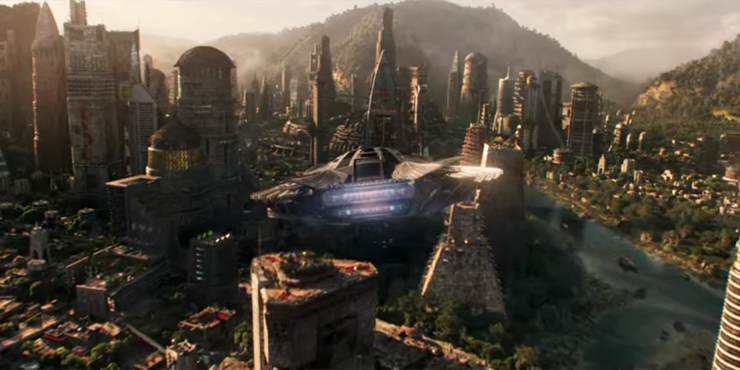
One reason why Killmonger comes across as sympathetic up to a point is that he’s actually right. In fact, T’Challa himself agrees with his larger point, as seen by his actions at the end of the film. Ryan Coogler addresses full on the major issue with a “hidden nation” of technological marvels, particularly in Africa, and particularly one that’s supposed to be run by a heroic character. Wakanda stood by and stayed hidden with their hoard of vibranium while all around them other Africans were exploited, the continent itself mined for resources both monetary and human for centuries. And the Wakandans did nothing to help their fellows. That’s seriously problematic, and while Killmonger’s solution goes too far in the other direction—as T’Challa himself says, he’s becoming the thing he despises—that doesn’t change that this is a major wrong that must be put right. Coogler provides a subtle but strong message, sometimes just by picking his locations both physical and temporal—it’s not a coincidence that the first scene in the movie takes place in the year of the Rodney King riots and in the city where the Black Panther Party got started.
Chadwick Boseman was the heart and soul of Civil War as T’Challa, and he’s even better here when given the lead. What’s especially nice is that he finally breaks the Marvel hero template, and it’s long overdue. While there are minor variations, pretty much every male Marvel protagonist is a snarky dude—Tony Stark’s snark is leavened by narcissistic arrogance, ditto Stephen Strange’s, Steve Rogers’s is leavened by earnestness, Nick Fury’s by badassitude, Peter Parker’s by youthful jibber-jabber, Scott Lang’s by his being totally out of his depth most of the time, Peter Quill’s and Rocket’s by the pain of their pasts, and so on.
But T’Challa isn’t snarky! He’s dignified and reserved and noble and it’s such a welcome fucking change. He’s not stiff, either—he lets his guard down with Shuri, as the pair of them devolve into sibling banter every time they’re together—but the snark is reserved for other characters for whom it’s a better fit. (Would that the makers of Doctor Strange heeded this lesson.)
The rest of the cast is beyond stellar. Winston Duke practically steals the movie as M’Baku (and in this movie, that is a very difficult theft to accomplish), while Daniel Kaluuya brings a powerful intensity to W’Kabi. (It’s a shame that most of the relationship between W’Kabi and Okoye was left on the cutting room floor.) Andy Serkis brings the same delightful case of the manic I-don’t-give-a-fucks to the role of Klaue that he did in Age of Ultron. Angela Bassett is radiant in the mostly thankless role of Queen Ramonda, while the always-magnificent Martin Freeman brings a quiet heroism to the role of Ross, who winds up being the quintessential ally; he doesn’t try to take over the fight, he just asks what he can do to assist, and does so without (too much) fuss.
And then we have the three rock stars of the movie in Lupita Nyong’o, Letitia Wright, and the amazing Danai Gurira. Nyong’o is a powerful helpmeet as Nakia, who puts helping people above even her own country. Wright is the face of STEM in the MCU as Shuri (and I hate that she never got to meet Tony Stark, though I can’t imagine T’Challa would want the two of them anywhere near each other—still, I dreamt of a scene in Endgame where just as Stark is about to offer Shuri an internship at Stark Enterprises, Shuri instead offers Stark an internship in Wakanda). Gurira’s Okoye is the single scariest person in the MCU (teaming her with the Black Widow in Infinity War was a masterstroke), and a brilliantly realized creature of duty. The three of them are T’Challa’s primary support, and I love that the movie never once draws attention to the fact that all three of them are female.
Having said that, an issue I have with the movie is the treatment of women. Yes, the three main women are fantastic. But when T’Chaka died, why is it that T’Challa takes over running the kingdom? There’s a queen right there, yet Ramonda is never mentioned as a possible person to rule Wakanda. Since she appears to be younger than T’Chaka, it can’t be her age. So why isn’t she allowed to be queen in this theoretically progressive Wakanda?
More fundamentally, where is Killmonger’s mother? Where’s the consideration for Killmonger’s mother? It’s bad enough that T’Chaka killed N’Jobu, but he intended to bring him home without his wife (who never even gets the dignity of a name) and kid behind. Just another single black woman stuck raising a kid after the father dies or disappears. But what role does she play in his life? (To jump once again back to Loki, one of the trickster’s redeeming qualities was his love for Frigga.)
These are minor problems, overall, however. The film is beautiful, the film is powerful, and the film is important. On top of that, it beautifully embodies every era of its title character, from his earliest days in Fantastic Four and elsewhere by Stan Lee & Jack Kirby in the 1960s, to the seminal work done with the character by Don McGregor and Kirby in the 1970s, Christopher Priest in the 1990s, and Reginald Hudlin and Ta-Nehisi Coates in the 2000s.
Wakanda forever, dammit.
Next week, the last of the Civil War fallout trilogy, as we see look in on Scott Lang and the aftermath of his taking Cap’s side.
Keith R.A. DeCandido urges all and sundry to support his Patreon, where he posts cat pictures, excerpts from his works in progress, and TV and movie reviews, including most recently Dolemite is My Name and Snowfall, and exclusive vignettes featuring his original characters. Check it out!










